Bob Mayer's Blog, page 60
April 29, 2019
Area 51: Interstellar Publication Day!
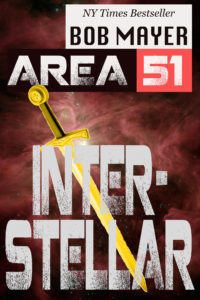
The latest in the Area 51 series is out today: AREA 51: INTERSTELLAR, and it’s a bit different than the earlier books. Someone who hasn’t read any of the other books can pick this one up and get right into the story. By the end, it loops back to the end of the other books, but it can also stand alone. Fans of the series, though, will see patterns they recognize and learn some deeper truths about the backstory of the entire series.
This kicks off a busy year with NEW YORK MINUTE already done, live in audio, and publishing on 24 June. Followed by LAWYERS, GUNS & MONEY and then OLD SOLDIERS.
And, yes, there will be more Area 51 books, because we are getting closer to finding out who humans really are; where the Swarm came from and its mission, and why are dogs so damn important?
Area 51 Interstellar– the latest from Bob Mayer
April 27, 2019
Happy 197th Birthday, Hiram Ulysses Grant
Happy birthday to my fellow West Point alum, Sam. The story of his name change is just one of many rather interesting facts about Grant’s early years before the Civil War. For more:
Ulysses S. Grant: The Early Years from Bob Mayer
April 26, 2019
The Green Beret Affair in 1969, helped lead to the release of the Pentagon Papers
During the Vietnam War, Special Forces often worked with the CIA on covert intelligence gathering missions. One of those units was Project GAMMA. On 6 August 1969, the commander of 5th Special Forces Group (Airborne) and 7 other Green Berets were arrested and charged with the murder of a Vietnamese double agent.
The free slideshow below describes what happened.
The Green Beret Affair. Vietnam. 1969 from Bob Mayer
April 19, 2019
The American Revolution could have ended on 11 Sept 1776. On Staten Island.
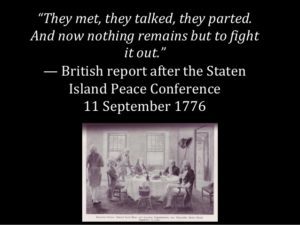
Benjamin Franklin, John Adams and Admiral Howe held a meeting on that day on the top of Staten Island to discuss halting the conflict even as George Washington’s troops were retreating after their defeat on Long Island.
This little known footnote to history might have been more than that if either side had really had the power to negotiate. But playing “what if” is my province as a fiction writer. Through in the shroud of the Time Patrol and one of the missions in my book Nine-Eleven (Time Patrol) is an attempt by the mysterious Shadow to make that meeting something other than it was. For if our past changes, what happens to our present?
Fiction based on fact. That is one of the cores of my books.
Here is more information on the meeting:
The Revolution Almost Ended on 11 September 1776 from Bob Mayer
Nothing but good times ahead! Unless the Shadow changes things.
April 17, 2019
The Green Beret series is back; and with free books
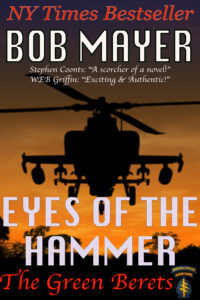
With over two million copies sold, the Green Beret series was my first and closest to me. I wrote six initially featuring Dave Riley, starting with Eyes of the Hammer (free on all ebook platforms) through Z: Final Countdown. Then I was into my Area 51 series. I went back to the Green Berets with Chasing the Ghost, one of my favorites, featuring Horace Chase. Dave Riley is in the background in that book but moves into the story by the 9th and last one published: Chasing the Son (currently free through 21 April).
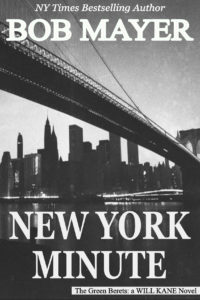
Now I’m revisiting the series with a vengeance this year. New York Minute could be considered a precursor, set in New York City in 1977. Dave Riley is 17 years old and makes an appearance but the focus is on Will Kane, an ex-Green Beret who is Riley’s older cousin. This comes out 24 June then Kane is back on 16 September in Lawyers, Guns and Money. Then I’ll leap back to the present with current day Dave Riley in Old Soldiers on 9 December.
Nothing but good times and lots of action ahead!
April 15, 2019
The State of Publishing and Quitting Writing

I’ve seen a number of posts lately with writers dismayed at the state of the industry and their careers. Which actually, I’ve been hearing ever since I got into this business. Not much new except for the details.
It’s always been hard. I’ve been writing for a living for 30 years. Across the board: trad, hybrid, indie, Amazon Publishing, stone etchings, you name it.
Here’s my take on Amazon, having worked with them from the beginning. Read The Everything Store. Understand Jeff Bezos. He’ll cut your heart out if it suits his winning. HOWEVER– before Amazon, self-pubbing was a joke. A lot of us are making good money off of kindle and all the assorted links. Does it mean we don’t consider changes to our business model? No. I’m constantly revamping my business model. Trad authors have to seriously factor in the possibility of Barnes and Noble going under. That will devastate the trad middle list, which is already teetering. Amazon changing royalties or firing the Death Star needs to be factored in.
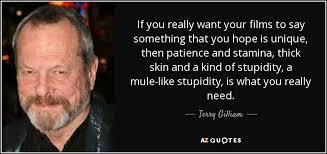
Quitting? Not a possibility. As Terry Gilliam said: creative people need mule-like stupidity. I’ve got that in spades.
Yeah– no one is blogging about terrible sales like they were about great sales during the Golden Age of indie publishing. There are very, very few authors who have not seen revenue drop, whether indie or traditional or hybrid or stone-etching. In fact, I’m limiting social media more and more because all you see are the success stories touted. It can get you down. But we never know the true story behind the story. As they say in the artillery: looked good from here, but that story might not be so good in reality. The only story I really know is my own (although, to be more accurate, the story my wife tells me is my story).
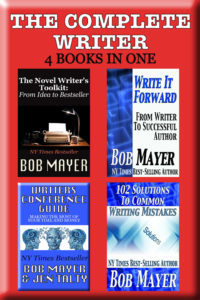 https://amzn.to/2XbCrGm
https://amzn.to/2XbCrGmBottom line,
it is still the best time ever to be a writer: all that stands between
the writer and the reader is the internet. We get to choose the channels
we use to get there, but WE GET TO CHOOSE. Then the reader chooses our
level of success in financial terms.
From those stone-etching days into the future, the world will always need story-tellers. That’s our job. More importantly, it’s our passion.
PS: Pre-order for New York Minute is live on all platforms. Very excited about launching this new series with Will Kane, who is actually the cousin of Dave Riley from Green Beret series.
April 14, 2019
The Most Important Event in US History? 14 April 1865
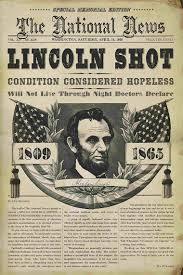
We all agree this was a tragic event, but also there seems to be a feeling that since the Civil War was essentially “won” at the time, that it wasn’t earth-shattering.
I submit that Lincoln’s assassination is one of, if not the most, important event in our country’s history since the writing of the Constitution.
Why? Because the Civil War wasn’t truly won. Yes, military victory was secured, but the goals of the war were not. What really needed to happen, as the very event of the war proved, was that the Constitution needed to be rewritten without the factor of slavery as an integral part.
I know many will argue with me but there are so many parts of the Constitution that were written with slavery playing a significant factor. Outlawing slavery didn’t changes those parts. The electoral college? Think what an effect that has had in our lifetime with two presidents elected with a minority of vote? The Second Amendment? The fear of slave insurrection played a huge part in that; please spare me the tyranny thing, because the Civil War actually a result of 2A being acted out.
Lincoln was the one man with the smarts and the will to have gotten the United States a new Constitution out of the ashes of the Civil War. His death lead to appeasement, Jim Crow, and many of our present day problems.
His assassination 154 years ago today affects us much more than Kennedy’s more recent one.
Just my two cents, but I’ve been reflecting a lot on the Constitution and our current problems and I believe most of it stems from the original document allowing slavery to exist; a horrible and completely unethical compromise that has tainted our country ever since. And we are now the ones that will live out this tragic event.
Duty, Honor, Country: A Novel of West Point and the Civil War
April 12, 2019
The Pinkertons are Planning for Disaster
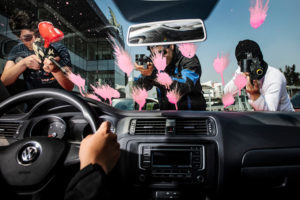
Yes, the Pinkertons. When I saw the image with the pink paintballs in the NY Times article, I thought it was some kind of joke; I didn’t think of the Pinkerton Agency. I didn’t even know it still existed.
So I didn’t read the article until last night. Essentially, the Pinkertons are getting into assisting businesses affected by climate change. They’ve provided armed escort on the ground after various disasters and now they’re trying to help on the front end. You can read the article and it’s worthwhile. To a point.
The most interesting part though, was at the end where the Pinkerton employee who has a job related to helping businesses with preparing for possible climate change disasters has just bought a place in Miami. Which is in dire danger from sea level change. And he said– well, the place won’t be ready until 2021, so he wasn’t concerned at the moment. Which pretty much negated the entire concept of his job.
And that, my friends, is the problem. We don’t deal with possible threats, no matter how likely. 80% of US counties have had a weather related natural disaster in the past 10 years. Yet the vast majority of people are not prepared for the most likely natural disaster for their area. Most businesses have not conducted an Area Study for climate threats. Many have emergency plans in place for other things, job related– such as if their computer system goes out. But what about a flood in the area? Long term power outage? Derailment in the locale that releases toxis gasses? Do people even know what the most likely natural and man-made threats are?
When I was writing my survival guide I researched the manuals already out there and, based on my Special Forces background, noted a glaring omission. The manuals were one size fits all. They bypassed the first thing we did when we received a mission tasking in SF: the Area Study (free slideshow overview). How can you plan for something when you don’t know exactly what you’re planning for and can’t focus your energies?
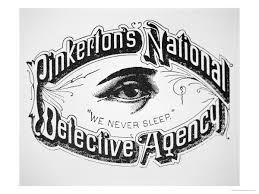
The slideshow I linked is an overview. I also cover the Area Study in more detail in The Procrastinator’s Survival Guide. More importantly, I offer one day workshops for people and organizations on doing one, because it requires a certain mindset to fully appreciate what is entailed. It requires looking at the world around us with a different set of eyes.
Or you could hire the Pinkertons.
April 11, 2019
Anatomy of a Scene
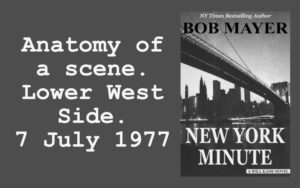
This is the opening scene of New York Minute— the event that starts everything in motion heading toward a bloody showdown a week later, when the Blackout occurs on 13 July.
Thursday Night, 7 July 1977WEST
VILLAGE, MANHATTAN
On the far side of a lot cluttered with rotting
garbage, dumped furniture and torched cars, the abandoned, elevated West Side
Highway loomed like a curtain about to go down on New York City. Beyond, on the
Hudson River waterfront, squatted the Christopher Street Pier, once the berth
for classic ocean liners and cargo ships, but now dark, derelict and a haven
for both furtive and brazen figures meeting to do what they dared not
elsewhere. Most of Manhattan was brightly lit, but the waterfront was darkness,
with the lights of New Jersey farther away than the width of the river.
William Kane waited on a slice, extra
pepperoni, when he spotted a wraith he pegged as trouble approach from the darkness
underneath the West Side Highway. The pizza joint was tiny, dirty and Kane
wasn’t optimistic about what was warming up in the oven, but he’d been
following Alfonso Delgado all evening, it was almost midnight, and this was the
only available food west of Washington Street.
Kane sat at one of two sticky surfaced Formica
tables crowded along the wall, leaving barely enough room for someone to slide
past to the counter. One of the long fluorescent lights was out, tilting the
light in the joint. It was hot and oppressively humid. The absentee owner
wasn’t going to waste money on air-conditioning with two ovens going full blast
and a single employee slaving away in the midst of a sweltering New York City
July. Kane’s chair was angled toward the propped open door, back to the wall.
The junkie entered reeking of sweat,
desperation and the aforementioned trouble. Not just because he was strung out,
a person couldn’t swing one of the dead rats by the piers without running into the
like, but also by the tense hitch in his shoulders and the one hand in the
pocket of the stained olive drab Army field jacket. He was dirty white with filthy
long hair of indeterminate color, scraggly beard, tall and thin in his worn-out,
done with life, mid-thirties. A muscle on the left side of his face danced to
the dark beat of his subconscious.
The stained field jacket presented history a
former soldier like Kane could interpret via the subdued patches: the winged
dagger of the 173rd Airborne on the right shoulder and Screaming
Eagle of the 101st on the left. These indicated combat and current
assignments, although both were in this guy’s past. The standard embroidered US
Army tag above the right pocket. The man earned a smart point for removing the nametag
above the left pocket given the not-as-dirty-strip of exposed jacket along with
the outline where the name and a combat infantry badge and jump wings had recently
resided.
Kane hoped the youngster behind the counter
wasn’t willing to die for minimum wage and paltry tips.
The junkie eyed Kane and shifted to the pizza
maker. “The cash. Now. On the counter.”
Kane was only slightly better dressed than the
junkie, but he was cleaner. Jungle fatigue pants dyed black with pockets on the
thighs. The cuffs were banded over the tops of faded green canvas uppers and worn
black leather jungle boots. He wore a gray t-shirt, covered by a slightly too
long unbuttoned, blue denim shirt, with the sleeves rolled up as far as they
would go. A rust-stained, green canvas map case rested on the Formica table.
Kane was six feet, lean, with an angular face
smeared by two days of not shaving and topped with thick, black hair, poorly
cut and not recently combed. Thirty-two hard years had sprinkled some gray in
the hair and chiseled lines in his face. His eyes were green, a gift from his
father’s side of the family.
“Oh, come on,” the pizza maker said. “Gimme a
break. Second time this month and it’s only the seventh.”
The junkie pulled a small nickel-plated revolver
out of the pocket and jabbed it around. “The cash.” He checked Kane once more.
“Don’t get any ideas.”
Kane had his hands flat on the map case. “I’ve
run out of them today, sarge. I just want my slice. Got places to go. People to
see.”
“Yeah, don’t we all,” the junkie said. The
revolver was crap; one of those cheap .22 caliber pieces the press titled
‘Saturday Night Specials’. Their more realistic moniker was ‘suicide specials’.
The pizza maker opened the register and slapped
an anemic cluster of greasy bills on the counter. “That’s all.”
“The change.”
“Oh, come on,” the pizza maker said, displaying
a limited verbal range of outrage. He grabbed a paper cup and clattered it with
coins from the register’s tray.
The junkie stuffed the bills in a pocket. Picked
up the cup of change with his free hand. He turned toward Kane. Glanced at the
map case. Kane looked him in the eyes, his face passive, and waited for the junkie’s
dancing pupils to focus.
The junkie evaluated through jumbled synapses. Trickles
of sweat slid down his face. Kane arched an eyebrow and leaned forward
slightly, enough to let the denim shirt fall to the side and display the rough grip
for a .45 automatic in an un-topped holster on his left hip. “How you doing,
Sky Soldier?”
The junkie’s face twitched, but he gave a slight
nod at the moniker for the paratroopers of the 173rd Airborne
Brigade. “I’ve had better days.”
“You probably want a few more,” Kane said. “I’ve
seen people kill with a twenty-two but they were experts and knew exactly where
to shoot and were closer than you and I. With a forty-five, it’s like depth
charges and nuclear bombs, I only gotta get a piece of you and the rest is
going with it.”
“Yeah,” the junkie said, still evaluating. He
squinted. “That blood on the map case?”
“Old blood. Second of the five-oh-third.”
“Fourth of the five-oh-third,” the junkie
automatically responded with his 173rd battalion designation. He
pondered the course and length of the rest of his life for another moment,
desired it to be a bit longer, and departed, gun in one hand, change in the
other, still drawing air.
“What da’ fuck,” the pizza maker said to Kane.
“You got a gun?”
Kane stood and looped the strap for the map
case over his left shoulder to hang on his right hip, opposite the .45. “You
think I’m gonna pull a gun on a guy over this?” Kane’s accent was remnant Bronx,
muted by over a decade and a half away from the city.
“He took everything from the register.”
“The money’s your problem,” Kane said. “I’m
talking about my slice.”
“What da’ fuck you carry a gun for if you ain’t
gonna use it?”
Kane frowned. “Habit? The frown twisted the end
of a knotted sliver of scar tissue stretching from under the thick hair on the
right side of his head. “My slice is done; I don’t like it hot.”
“The money ain’t mine. It’s my boss’s.”
“Not your problem then.”
“He’s gonna dock my pay,” the pizza maker complained.
“And why didn’t he take your wallet? Or your bag?”
“He’s not that far gone,” Kane said. “He wasn’t
going to shoot and he didn’t want to die. How much did he get?”
“Eight-two dollars. And the change. Maybe
another five.”
Kane pulled out a money clip, extracted six
twenties. “He didn’t take your tips,” Kane noted, as he stuffed the bills into the
coffee can that held lonely singles and loose change, mostly pennies. “That’s
the problem with being high. You miss things.” He nodded toward the oven. “My
slice?”
Muttering, the pizza maker removed the slice
with his peel, slid it on a thin paper plate, which was immediately soaked with
greasy oil. Kane picked it up with his right hand and folded in half. Took a
bite while avoiding the run off.
It was crappy as expected but it was pizza and
this was New York City.
He exited Dino’s, as proclaimed by a muted neon
sign, and vaguely vowed never to return. He drew the .45 with his left hand and
flicked off the custom ambidextrous safety with his thumb. He stepped to the darkness
at the side of the door to avoid being silhouetted against the lights. No sign
of the junkie.
Kane took another bite. His boss, Toni
Marcelle, called this R&D. Research and development. Except it never went
beyond the research phase for him; the developing was her expertise. This was where
he’d followed Alfonso Delgado, traveling alone, from a mob hangout, the
Triangle Social Club on Sullivan Street in Tribeca. It was a good news, bad
news situation. Good for Toni in her development of the divorce case that
Delgado ended up here, but not so great on the research end for Kane. The norm.
Even though Kane lived eight blocks away, he hadn’t
been on or inside any of the piers in years. He had vague memories of his
father driving the family down from the Bronx to see Grandma, his father’s
mother, off on a stately ocean liner to visit the ‘old country’. The ocean
liner days were long past, a casualty of LaGuardia and Kennedy Airports,
another part of New York City’s history overtaken by technology and time.
The West Side Highway, formerly the main car route
along the west edge of the island of Manhattan, had been closed for four years
from 23rd Street to the southern end. Ever since an overloaded northbound
dump truck dropped through the roadway not far from here and it was reluctantly
decided by the city that the road might be unsafe. New York was not a car
friendly city, not just because of the terrible condition of the roads but the vertical
density of the population. To keep a car in Manhattan was an expensive
proposition.
The extensive subway network was the arteries
that moved the people, but wasn’t in much better shape than the West Side
Highway. Subway cars were lathered in graffiti making it impossible to see out
the windows. The PA system announcement for upcoming stations was a garbled
crackle of static that seemed a taunt by burnt out conductors rather than an
attempt at conveying location. Crime was rampant and the transit police traveled
in pairs. Nevertheless, native New Yorkers made it the most traveled train
system in the country.
Kane’s right hand was slippery with oil when he
finished the slice. He wiped it on his pants, staining the black darker. He walked
underneath the West Side Highway, between rusting iron stanchions holding up
the remains of the roadway, moving from city light to abandoned darkness. Kane paused
on the far side a few moments. Checked if his presence spooked anything. He
looked up, but the glow from the city behind him, diffused by the humid air and
smog, hid the stars from view.
The pier extended into the polluted Hudson. It
consisted of a long row of attached buildings and warehouses merging into one.
Some had been passenger areas, others for freight. Now it was a maze of rotting
wood and rusting metal sprawled on top of concrete slabs perched on pilings
pounded into the river bottom.
Kane reached into the map case and retrieved
night vision goggles. Turned them on, waited for the battery to boot, then
slipped them over his head. He tightened the rubber straps as he did a survey.
Everything on the interior screen was outlined in two-dimensional shades of green
and the light was enhanced. The lack of depth perception was a drawback, but a
worthwhile trade in order to see into the dark corners where the lions and
tigers and bears preferred to hide.
The standard New York cacophony was behind him:
sirens, traffic, car horns, the never-ending rumble of the City That Never
Sleeps but was currently slumbering uneasily from fear of a gunman dubbed Son
of Sam. Ahead was relatively quiet. Kane hefted the .45, finger resting on the
outside edge of the trigger guard. The hammer was back and there was a round in
the chamber and a full magazine in the grip, not approved for amateurs, which
Kane was anything but.
The concrete floor was littered with debris so Kane
slid his feet along, the way he’d done at night on patrol in the Central
Highlands and on recon over the border in Cambodia, every nerve alert for a
tripwire, expecting a burst of AK fire to shred his chest with 7.62mm.
Kane paused and took a few breaths.
There were different noises when he entered the
largest building on the Christopher Street Pier and the sounds of the city dimmed.
Below, the Hudson River gurgled and slapped against the pilings. Ahead there
were grunts and murmurs and gasps in the darkness. The rhythmic smack of flesh
against flesh. The smell was rotting wood, salt water, pollution, urine, sweat
and sex.
Fuck Alfonso Delgado for making him come to
this place. Kane briefly played with the idea of killing him, but he could more
realistically imagine Toni giving him shit: what
the hell, Kane? A dead guy can’t pay alimony.
This was New York, not Vietnam, and Kane had
made a vow about ever killing. Again.
A flashing light from a beacon on the Jersey
side of the Hudson cast abrupt shadows through the broken windows and fractured
walls into the interior every ten seconds. It momentarily flared out the
goggles each time. Kane waited through four iterations until he had the rhythm
of the troublesome light.
Fuck New Jersey too.
Hushed conversations murmured, but it was mainly
animal/human noises: raw, uninhibited sex. Two men were fucking to his left,
one bent over the waist, the other standing behind holding a leash attached to
a collar around the first man’s neck. They wore only boots and leather caps. Two
more, similarly undressed, waited in line, stroking their cocks in anticipation.
He saw them and three seconds later they saw him in the strobe of light. They
ignored and he returned the favor since none were Delgado.
Kane went deeper into the illicit abyss. A
light flared in the distant darkness, a blaze in the goggles, someone lighting
up a cig or joint. Kane thought of a sniper waiting in the dark for that brief
illumination and squeezing off a bullet directly into the spot, putting an
exclamation point on the Surgeon General’s warning.
An odd, snapping sound caught his attention.
There was a glow coming through a gap in the interior wall. Kane turned the
NVG’s off and pushed them up on his head. Through the hole he saw several
candles flickering in a circle. In the center, a naked man was tiptoed on a two-foot
high wood crate. A rope was cinched around his neck and went over a ceiling
strut, terminating at a small winch that was snap-linked to one of the metal
supports. The man’s hands were on the rope, grasping it above his head, keeping
himself steady. His legs were shaking on his precarious perch. Blood and sweat
dripped down bare skin and his cock was erect. Another man, wearing black leather
pants and vest, head covered with a black leather hood stood behind him, whip
in hand. A half-dozen silhouettes surrounded the spectacle in rapt audience. None
wore suits and unfortunately the naked man wasn’t Delgado.
Kane slipped through the gap and gave the group
a wide berth.
There was movement to the right, along the
outer wall, partially hidden by a stanchion.
The whip struck flesh.
A suit had his back against the outer wall, pants
down, two people kneeling in front of him. Kane slid the .45 into the holster
and retrieved the camera from the map case. Oriented the camera toward the
subjects and squeezed his eyes shut.
The flash went off, then once more.
“Motherfucker!” Alfonso Delgado screamed as he
scrambled to pull up trousers.
Kane opened his eyes. He shoved the camera in
the bag, drew the .45, and retraced his steps, surer of the way, avoiding the
whipping and other debauchery. He removed the goggles as he left the pier, walked
underneath the Highway, and re-entered what passed for civilization in lower Manhattan.
He skirted the hulk of a burnt-out car sitting on blocks in a vacant lot. Kane
holstered the pistol, levering the safety into its slot on the modified slide as
he did so.
He proceeded along West 10th. Few
people were about this late. He paused on the corner of Washington, which ran
north-south. To his right, rising above the brownstones, vacant lots filled
with debris and the run-down tenements and businesses of Greenwich Village, were
the brilliantly lit, shiny, twin pillars of the World Trade Center. The ground
had been broken for them the year Kane graduated West Point, 1966, and both towers
had topped out in 1970. Four years of construction mirroring the four years of
deconstruction in Kane’s life. From proud West Point graduate parading on the
Plain to abject military prisoner. Red aircraft warning lights were flashing on
what had been the world’s tallest buildings until three years ago when the
Sears Tower in Chicago bested them, another chunk of pride bitten out of the
Big Apple.
Kane felt the ghost of something, combat past
or threat present or dismal future, tingle his spine.
He peered at his back trail but the street was
clear.
Headlights cut the darkness as a bulky yellow cab
rumbled by on cobblestones.
He remained still, waiting. Nothing.
Kane proceeded north on Washington, a main
artery of Greenwich Village. A scattering of pedestrians, wary of each other,
some crossing the street to avoid close passage. It wasn’t just the usual
native caution; there was the specter of Son of Sam, still out there almost a
year since his first attack. Kane continually checked for anyone following, zigzagging
the street four times, with the occasional pause.
When he reached Jane Street he cornered right, remaining
on the south side until mid-block. The street was cobblestone with trees arcing
overhead along both sidewalks. A few streetlights struggled against the night.
Kane crossed over. Swung open the gate in a waist-high
black wrought iron fence leading to the lowest level of an old three-story brownstone.
The oiled hinges were silent. After shutting the gate, he knelt on the steps and
faced back the way he’d come, hand hovering over the .45. No one on the street.
Waited twenty heartbeats. Rose and took the four steps. The entrance for the
basement apartment was to the left, underneath the steps leading to the main
floor. There was a small arched alcove in front of the door.
Kane checked the matchstick stuck in the door jamb
a foot above the ground insuring it was undisturbed, then unlocked and entered,
putting the matchstick on the small table inside. Turned the light on. Out the
entry, he was in a small sitting area with a horizontal, narrow, street-level window
under the low ceiling. Down the short hall was a bedroom with no window,
bathroom to the left side crammed beneath the upstairs hallway and finally a tiny
kitchen and a door leading to steps to the small courtyard in back where the
owner kept a struggling garden surrounded by buildings fore and aft and wood
fences left and right.
The furniture was cheap second-hand, suitable
to an equally inexpensive rental from the owner residing on the top two floors.
The walls were lined with cinderblocks supporting bowed boards loaded with
books. Hardcovers and paperbacks were stacked upright, sideways, there seemed
to be no pattern to the placement. Above the door frame leading to the bathroom
was a four-foot-long board with holes every three inches in it. Two long pegs
were inserted. The bathroom doubled as a field expedient dark room and Kane
carried the camera inside, then stepped back to the frame, gave a slight jump,
grabbing a peg in each hand. He did several pullups, then moved the left peg
one hole further out, a few more pullups, extended another hole and several
more. When his arms were vibrating from effort, he dropped and got to work
developing the film.
Propped against any available wall space not
covered by books were framed prints of maps, primarily of New York City in
various phases of its evolution from the Cortelyou Map of New Amsterdam in 1660
through a Michelin map from 1962, Kane’s senior year in high school. The glass and
frames were covered in dust. None had been hung.
As Kane mixed chemicals in the old sink to
develop the film, he reflected on another shit job completed and nobody dead. A
decent evening. Especially given the last and most significant time Kane was
involved in a killing it ended up on the cover of Life Magazine.
Perhaps that wasn’t the best thought for Kane
to have. With the photos hanging and developing, he dragged his poncho liner
and sleeping pad under the kitchen table and settled down. As he drifted off,
crossing the threshold of his tight conscious control, the junkie in the pizza
joint wormed out of his subconscious.
The 173rd and Ted had been the last
thing he needed to be reminded of.
April 7, 2019
Ranger School 24 October 1966. Anatomy of a Scene
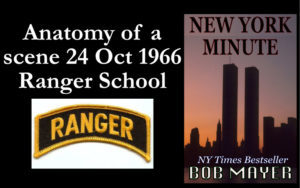
Ranger School is one of the tougher military schools. Some say the toughest, although combat diver might argue and certainly SEALs would disagree. I found the Robin Sage phase of the Special Forces Qualification Course to a be a total mind fuck. Lots of lose-lose scenarios as in Star Trek’s Kobayashi Maru mode.
This scene is the second one in New York Minute. It
is a flashback, which many warn against; it’s one of four in the book. But they
are key to understanding my protagonist, Will Kane, and how a warrior is made.
It also foreshadows, as all good scenes do. And, after all, the title of the
book is New York Minute. You’ll see as you read. Here’s the really,
really interesting thing: I had the title before I came up with this scene or
how the minute is used later in the book. Writers– trust your subconscious.
It
also introduces a real life, perhaps bigger than life, person, Chargin’ Charlie
Beckwith who would go on from this assignment to form Delta Force, a
development which will come up in a future book in the Will Kane series. Will
Kane, my protagonist, has just graduated West Point, class of 1966. He is in
the last phase of Ranger School. His wife gave birth on the first day of Ranger
School and he hasn’t seen his son yet.
Always remember: the n in Ranger stand for knowledge!
Monday, 24 October 1966
AUXILIARY FIELD SEVEN, EGLIN AIR FORCE BASE RESERVATION, FLORIDA
“Previous class said he’s crazy,” Ted Marcelle whispers to Kane as they ride in the open back of a deuce and a half truck through the flat Florida panhandle wasteland. Endless scrub, palmettos, stinking water, gators, mud and, of course, snakes, await.
According
to the scuttlebutt from the last Ranger class to pass through, there is worse
in human form.
Ted
looks like hell. The left side of his face is blistered and swollen from poison
ivy brushed against in the mountains of Georgia. It’s covered in white Calamine
lotion, but the medicine hasn’t been helping.
“Doolittle
trained his crews for the Tokyo mission here.” Kane points at the cracking and
weed infested long stretch of concrete: Auxiliary Field Seven.
Ted
doesn’t care about history. He’s looking ahead. Literally. “You don’t think he
killed them?” Ted asks, indicating the bodies.
Fires
flicker in barrels. An old truck burns. Soldiers wearing American uniforms are
strewn about. The trucks carrying Ted, Kane and the rest of their Ranger Class
roll through the ambush. A man wearing black pajamas stands in the far
treeline, an AK-47 in his hands. As quickly as he’s seen, he disappears into
the scrub.
The
Ranger students have all lost weight over the past six weeks of training at
Fort Benning and in the mountains around Dahlonega, Georgia. They’re battered,
bruised, exhausted and despite a brief 24 hours respite before this phase,
starving. Six weeks of one c-ration a day takes everyone down a step on the
evolutionary scale. Many are regretting the steaks they’d gorged on during that
short break, as it reignited the hunger. They’d reached the point by the end of
the mountain phase where hunger is such a constant it’s the norm. A partly
deranged Ranger student trying to put imaginary coins into a tree believing
it’s a vending machine is viewed with little notice.
The
same with exhaustion. They’re surviving at the first, base level of Maslow’s
hierarchy of needs: lacking food, water, warmth, rest, and shelter. Ranger
School is breaking them down to see how they act and react under stress. War is
chaos, war is confusion, war is exhaustion, war is man at his most primitive.
Ranger School is the Army’s attempt to get as close to that as possible without
killing them, although students occasionally do die in the swamps, usually from
hypothermia.
Kane
had not been able to see his newly born son during the abbreviated break before
this phase, because Taryn had gone to her parents in New York, rather than sit
alone with Joseph in a squalid apartment in Columbus, Georgia for two months
amongst all the rednecks. He’d talked briefly with her on the phone. Listened
to Lil’ Joe cry in the background. Felt the distance. The absence.
With
a squeal of brakes, the truck abruptly stops. The Ranger students tumble in the
cargo bay. It’s deliberate, as the other trucks halt the same way.
“Get
out!” A Ranger Instructor, RI, screams. “Get out!”
The
students don’t wait for the cargo strap in the back to be unhooked or the gate
dropped. They’ve been in this situation before. They pour over the sides of the
trucks, falling to the ground with their gear.
Kane
hits hard, his rucksack twisting his back, his rifle almost impaling him. He
scrambles to his feet. Ted is upright, weapon at the ready.
“Fall
in!” the RI orders.
The
Ranger Students assemble. Their numbers are less than the 212 who started six
weeks ago. Injury has taken the unlucky, although most will be recycled, once
they heal, and go through it again. Some have quit, an unthinkable and
career-ending decision for an Infantry officer. Kane and Ted had watched a
couple of classmates they’d thought competent simply give up.
This
isn’t West Point. This is finishing school for Infantry officers and the
training for enlisted who are members of elite Ranger units. The newly
installed commander of this phase, Charlie Beckwith has taken it to another
level: this is preparation for the real war raging on the other side of the
globe; no longer just a career ticket punch.
“Ground
your rucks.”
They
shrug off their rucksacks and deposit them at their feet.
“In
the bleachers!”
The
students rush the bleachers. Nothing is done at a walk.
One
small blessing is the decent weather. Not the brutal heat of the Florida
summer. Not the chilling, wet cold of the winter to come where graduates sewed
their tab on with white thread ever after. They are in the sweet spot for
Florida Ranger.
The
hard, wooden bleachers are uncomfortable. Kane barely notices. He’s in a
timeless zone inside his head.
There’s
a faux tombstone propped against a tree:
Here lies the bones
Of Ranger Jones
A graduate of this institution.
He died last night
In his first fire fight
Using the school solution
Be flexible!
It’s
counter to the West Point culture of tradition. Indeed, contrary to the US
Army’s attitude toward warfare. A fact that is causing turmoil as a regular
army fights an irregular enemy on the other side of the world in a place few
have ever heard of. The Army is trying to unlearn the lessons of World War II
and Korea and relearn what their own predecessors had successfully implemented
against the British two hundred years ago. It isn’t going well.
“I
think the n in Ranger stands for knowledge,” Ted whispers to Kane.
Unlike
many around him, the burst of automatic weapon firing from the swamp doesn’t
startle Kane.
“Listen
carefully!” An RI dramatically holds a hand to his ear.
Another
burst.
“That,”
the RI intones, “is the weapon of choice of your enemy. The AK-47. It sounds
different than an M-14 or M-16. Get to know the sound. You WILL hear it again.
We’re going to make sure it isn’t the last sound you ever hear.”
The
man in black pajamas appears out of the swamp. He’s covered in mud. As is the
AK in his hands. He fires a burst, a testament to the Russian weapon’s
functionality. The students duck. The crack of the rounds going overhead is the
first time most have experienced bullets coming their way.
“Listen
up, you fucking pussies!” Major ‘Charging’ Charlie Beckwith strides forward,
owning the ground and their minds and bodies for the next three weeks.
Commander of this, the final phase of Ranger School. They’d lucked out with the
weather, but that luck hadn’t held with running into Beckwith’s taking over
here a few months ago. He’d transformed this phase from tough, but regular army
under the previous commander, into his version of hell on Earth and the reality
of unconventional warfare.
“Your
enemy wants you dead.” Beckwith’s voice is a southern growl. Born in Atlanta
he’d played for the Georgia Bulldogs and been drafted by the Green Bay Packers.
He’d turned down the pro contract in favor of the Army and the Korean War.
“They
tried killing me,” Beckwith informs them. He rips the mud encrusted black shirt
open, revealing a nasty scar running diagonally across his torso from pelvis to
clavicle. This is the result of a large .51 caliber bullet hitting Beckwith
while he was riding in a helicopter over Vietnam. He should have died and
before the next weeks will be over, everyone in the bleachers will wish he had.
The
scar gets everyone’s attention.
“They
will kill you!” Beckwith is at the bleachers, stalking back and forth, staring
students in the eye. “Each one of you. Every one of you. Unless you kill him
first. We’re going to teach you how to do that. If you listen to us, if you
learn, if you get the shit out of your ears, and all the useless bullshit
you’ve brought with you, your mother won’t get a telegram saying your son died
because he was fucking stupid! It will just say your son died.”
*****
Three
weeks later, on 12 November, it’s over. A surprise cold snap added unexpected
misery to the ordeal, producing hypothermia casualties and wiping away the
‘fortune’ of arriving between summer and winter Ranger. But Kane and Ted and
most of the others endure.
The
last mission, a seaborne assault in small rubber boats across a stretch of the
Gulf of Mexico to the objective on Santa Rosa Island is a success, culminating
after midnight. The head RI for the exercise actually congratulates the
students, ordering them onto deuce-and-a-halves to ride back to Field Seven for
graduation at 10 am later that day. He promises a warm, full breakfast, as
appealing as the black and gold Ranger tab to the starved students.
“We
did it,” Ted whispers to Kane, as if afraid being overheard will puncture this
bubble of success. “We did it.”
“We
did,” Kane agrees, also not quite believing it. He extends his hand to his
friend. “Ranger Marcelle.”
“Ranger
Kane.” Ted pulls Kane to him and they exchange a rancid, exhausted, proud hug.
Ted’s
face is a disaster, the poison ivy much worse. His left eye is swollen shut.
He’s fought the RI’s who want to medically recycle him, insisting he can do the
mission.
And
he has.
It’s
as satisfying a moment as tossing their hats into the air a few months earlier
at West Point. But Ted isn’t the same and it isn’t just the Ranger School
regime. A shadow hangs over him. Eight days earlier during a mission he cracked
one smart-ass comment too many. The leader of the ambushers, a staff sergeant
RI, had not been impressed, and ordered his men to take Ted prisoner.
Ted
was gone for 24 hours before returning to the patrol. He refused to tell Kane
what had happened. But he was different, withdrawn, his sense of humor gone. He
just muttered something about ‘these motherfuckers’.
But
that was all in the past now.
Kane
and Ted, along with the other students, collapse in the beds of the trucks,
bodies piling on top of each other. Fall into what an observer might consider
sleep, but is the unconsciousness of utter exhaustion. A tangle of sweaty,
dirty, muddy bodies, rucksacks and weapons. The trucks roll through the
darkness toward food and graduation.
Not
long after, the slamming of brakes shifts the bodies, but most do not rise to
consciousness.
RIs
go down the line of trucks, banging on the metal sides with pipes. “Everyone out!
Get your asses out of the trucks. ASAP! Move it! Move it!”
“You
gotta be shitting me,” Ted mutters. “These motherfuckers.”
Kane
sits up.
A
flashlight is dancing about as an RI drops the gate and shines it into the
cargo bay. He grabs the closest student’s LBE and pulls him out. “Form up!”
Ted
sits. “This isn’t Field Seven.”
“Maybe
they brought chow to us?” one student wonders.
“Ha!”
Ted snaps.
Kane
pushes along the metal floor toward the edge. Slides to the ground before he
can be pulled out. Ted tumbles next to him. Grumbling, cursing, the survivors
of the Ranger Class form ranks in a gravel parking lit by a single, sputtering
light high on a telephone pole. Crickets chirp. No one has a clue where they
are, except it’s not where they were told they were going. There’s no smell of
cooking food or hot coffee. Just the chill dampness of a dark Panhandle night.
A
jeep skids to a halt in front of the scraggly formation. Beckwith jumps on the
hood as several RIs direct their flashlights at him. He hovers otherworldly in
the halo of light.
“Men!
Listen up! Field Seven might be attacked unless we get there first. We’ve got
one more march to make. I give you my word. Just one more.” He points to his
left, along the dark stretch of road. “We only have to get there. That’s all.
We don’t have to be tactical. We’ll take the road. That’s easy enough.”
“Why
not take the fucking trucks then?” Ted mutters, but no one laughs. Curses of
despair and rage ripple through the ranks, but Beckwith seems not to hear.
“I’m
going with you men,” Beckwith says.
“Lucky
us,” Ted says to Kane.
“Gut
it out minute,” Kane replies to his Beast roommate.
“I
don’t think Field Seven is a minute away,” Ted notes.
The
class begins to move. Two columns, one on either side of the road. No one knows
how far they have to go except Beckwith and the RIs.
As
he staggers along Kane hears someone crying in the darkness. Others are cursing
repeatedly, a mantra of hate toward Beckwith.
There’s
a clatter as a student throws away his rifle and falls to his knees. “I can’t.
I just can’t.” He curls into a ball, sobbing.
The
columns leave him behind. Occasionally a civilian car rolls past, wide eyes
staring at the line of dirty zombies staggering on either side of the road.
Beckwith is everywhere, exhorting, cajoling, threatening, praising, cursing
them to keep moving.
Eventually,
after seven miles, they cross the bridge from Santa Rosa to the mainland and
that gives them a rough idea how far they are from Field Seven.
Ten
more miles.
Another
man collapses at this realization. Beckwith pulls him to his feet and pushes
him stumbling in the right direction.
They
lose track of time except when BMNT tinges the eastern horizon.
“Will?”
Ted says.
Kane
hears his friend with some distant part of his mind. He focuses on the minute.
That’s all he has to do. He passes it and focuses on the next minute.
“Will?”
“Yeah?”
“I
can’t go any farther.”
Kane
glances at Ted. He looks like a ghoul. Face drawn, good eye bulging, the other
swollen shut, drool on the sides of his mouth. Dried snot under his nose. Caked
sweat. The left side of his face a mass of blisters and sores.
“Bullshit,”
Kane says. “You can do it.”
“I
can’t. These people are crazy. You got no idea.”
“Gut
it out for a minute, Ted,” Kane says. He holds up his wrist, peels back the
Velcro covering on the Army-issue watch, the same camouflage band as the one on
Ted’s wrist, which they’d bought at Ranger Joe’s on Victory Drive outside Fort
Benning just before signing in to Ranger School. “I’ll time it. You can quit
after a minute. Okay? Just a minute.”
“Just
a minute? You promise?”
“Just
a minute. I promise.”
They
stagger along.
“That’s
gotta have been a minute,” Ted finally says.
“You’re
right. How about just one more? Then I’ll quit with you.”
They
continue on. Each ‘gut it out minute’ gets longer and longer, until it’s almost
ten minutes before Ted asks. And each time Kane promises he’ll give up with his
friend after just another minute.
Finally,
Ted says: “Fucking New York minutes, Will. You’re using New York minutes.”
“Yeah,
Ted. Another New York minute.”
“You’re
an asshole,” Ted says, but he gives a small laugh and Kane knows his friend will
make it.
Beckwith
suddenly appears in front of Ted. “You going to make it, Ranger?” His eyes
widen as he sees Ted’s face. “You’re the one! I heard about you. You’re one
tough son-of-a-bitch, Ranger. I’d serve with you anywhere.”
“Fuck
you, Beckwith,” Ted mutters.
Be ckwith moves to Kane. “Going to make it, Ranger?” He goes to the center of the road. “Oh yeah, boys. You want to run? Why don’t we run this last part?”
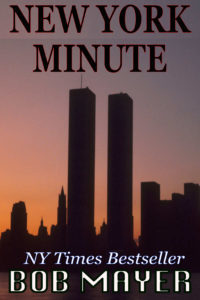
And Kane realizes Beckwith is telling the truth, it is the last part. Because there are the bleachers and there’s Field Seven and here’s the smell of hot chow in the air.
“Come
on, Ted.” Kane breaks into an accelerated stagger, a mockery of a run. Ted
automatically follows.
Beckwith
howls something almost inarticulate at the students as they cross the final
line.
Kane
finally understands as Beckwith howls it again.
“You’re Rangers now!”
NEW YORK MINUTE available on all eBook platforms



